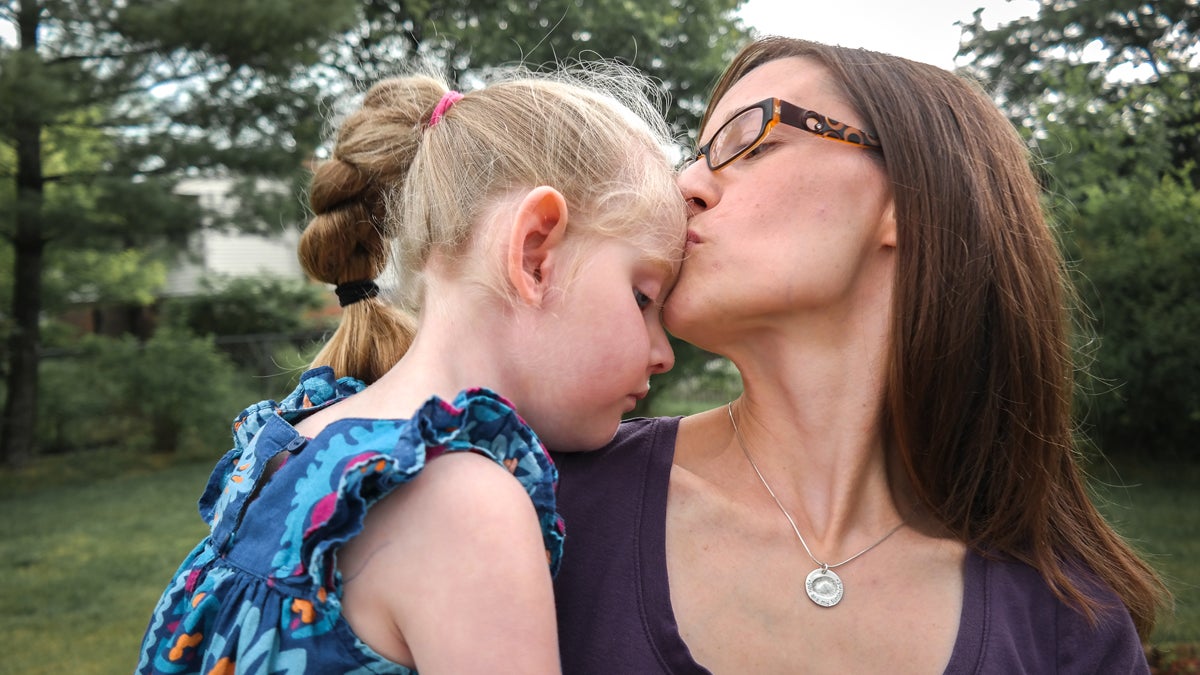Life after Norah
Listen
Liz Buvinger holding her daughter
A mom, a daughter, a disease, and time.
Liz Buvinger admits she can be a bit of a “planner”—even a Type A personality. So when it came to starting a family, she thought she’d follow the advice of her ambitious grad school peers and squeeze in a pregnancy during her third year of study.
“I had always heard that was a really good time because you were done with classes, but it was before crazy dissertation time started,” Buvinger says. “But that…that did not work out.”
She and her then-husband couldn’t get pregnant for about a year, and when they finally did, she miscarried twice. But they kept trying, and her third pregnancy gave them their daughter, Norah. The pregnancy and delivery were pretty uneventful—checking many of the typical boxes for a healthy baby. But within a month of Norah’s birth, Liz says she knew something wasn’t quite right. At seven months, she decided to have an MRI done of Norah’s brain.
“The MRI was very unusual. Our neurologist brought Norah’s MRI to the group to look at, and it just so happened that another one of the neurologists on the team had been an expert witness in a case that ended up involving pontocerebellar hypoplasia (PCH). And he recognized the dragonfly pattern that is present in these kids’ brains.”
PCH is a rare genetic neurological disorder which leaves children with little control over their own bodies and limited cognitive function. But Liz said the scariest part was coming to terms with the fact that Norah’s diagnosis meant she would likely have a very short life.
“The neurologist told me the median lifespan was about 50 months and that, typically, the kids died of SIDS. So I remember, I said to her, ‘So basically you’re telling me that I’m going to walk in one morning, and Norah will be dead in her crib.’ So then we had this death sentence on our hands and didn’t quite know what to do with that.”
For Liz, being the mother of a child with PCH has also meant learning to cherish the moments that many parents take for granted. Because Norah has little control over her own body, even a few seconds of meaningful eye contact is a rare breakthrough. And Liz says the few times in five years that Norah has fought to say the word “mom” have become unforgettable memories.
“Those moments are so exciting because you don’t always get a lot of reciprocity,” said Liz. “There was this one time when we were sitting right next to each other. And she started scooting and flailed her entire body over to me and got her head on my shoulder. And it was really neat to see her being like, ‘Mom, I want to be with you.’ In those moments, you’re like, ‘Oh, you do love me! You know who I am!’ Despite not being able to talk or show me, really, she finds ways.”
Another recent moment of joy was watching Norah lose her first two baby teeth.
“These were things I wasn’t sure we were even going to see. And it makes me so happy we’ve made it to one of the first big kid milestones.”
Perhaps the most important milestone they’ve reached: Norah turns five in July—meaning she’s already eclipsed the median lifespan for kids with PCH. And Liz says that after a tough winter and spring, Norah is again in good health. Since starting with pediatric hospice—a program which, unlike adult hospice, does not indicate the end of life is near—Norah has had the healthiest year since her diagnosis at nine months.
WHYY is your source for fact-based, in-depth journalism and information. As a nonprofit organization, we rely on financial support from readers like you. Please give today.



